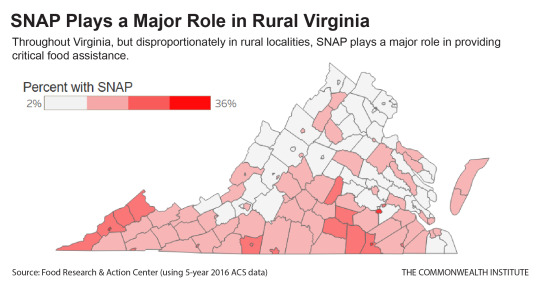May 3, 2018
Irony Alert: Proposed Farm Bill Means Less Food
Voting along party lines, Congressional Republicans are proposing to decrease nutritional assistance for low-income families in the Farm Bill, creating a partisan fight over a bill that has long had bipartisan support. The Supplemental Nutrition Assistance Program (SNAP), the most effective anti-hunger program in the country, supports over 374,000 households (794,780 individuals) on average each month in Virginia. But the newest Farm Bill proposal – passed by the House Agriculture Committee on April 18 and could be voted on by the full House this month – will end or cut SNAP benefits for many people, while setting up costly bureaucratic hurdles to qualify that do more harm than good.
SNAP kept 158,000 people in Virginia, including 79,000 children, above the poverty line ($20,420 for a family of three) in 2017. It also reduces the share of households who lack consistent access to nutritional food and lowers health care costs. Researchers found that the program had long-term positive impacts on children into adulthood. Those who had access to food stamps (compared to children in low-income families who did not) were less likely to be obese, less likely to be diagnosed with heart disease, and more likely to graduate from high school. It may be due to this effectiveness that SNAP has experienced bipartisan support since the 1960s.
The current Farm Bill proposal will likely weaken the SNAP program and the families it supports, including parents raising kids, people with disabilities, and working people. In cutting more than $17 billion in SNAP benefits, more than 2 million people are likely to lose all or a significant portion of nutrition assistance. This will hit rural localities and small towns in Virginia especially hard, where around 1 in 7 households and 1 in 5 households are supported by SNAP, respectively.

For a live map with locality specific information, click here.
Changes to the program’s current work requirements, in particular, will burden families with providing proof of work or exemption on a monthly basis. Workers in low-wage jobs typically do not have reliable schedules with consistent hours, and maintaining 20 hours a week every month may be problematic. If their boss cuts their hours, they are temporarily out of work, or they have missed work to care for a sick family member and do not meet the requirement, the bill would cut off assistance for 12 months (36 if it happens again) at a time when they may need it most.
The increase in reporting requirements would add administrative paperwork to many people who are already working. Nearly 80 percent of SNAP families nationally (79 percent in Virginia) had at least one working adult in the past 12 months.
People with serious mental illness and physical disabilities may struggle to navigate the system and meet the demands of providing proof of work or exemption. This may be especially true in Virginia where many low-income people do not have affordable access to health care and related documentation because the state has not expanded Medicaid.
Additional bureaucracy would also burden states, increasing staff and information systems to accommodate the extra work that would need to be done. Research of the Temporary Assistance to Needy Families (TANF) program suggests that workers lost TANF benefits for reasons other than not working such as administrative glitches, lack of understanding the rules, and an inability to protect those who qualified for exemptions from penalties. Adding red tape to SNAP will likely result in many people falling through the cracks, guaranteeing that nutrition assistance will be taken away.
Providing nutrition assistance through SNAP works. But rather than “farm-to-table”, the proposed changes to the Farm Bill would take nutrition assistance off of the table for many. This puts nearly 800,000 individuals in Virginia at risk and could have long-term consequences for Virginia’s children. Virginia’s Congressional lawmakers should oppose any bill that seeks to burden Virginia’s families and localities, and reignite the bipartisan efforts that have historically shaped the Farm Bill.
Category:
Economic Opportunity
